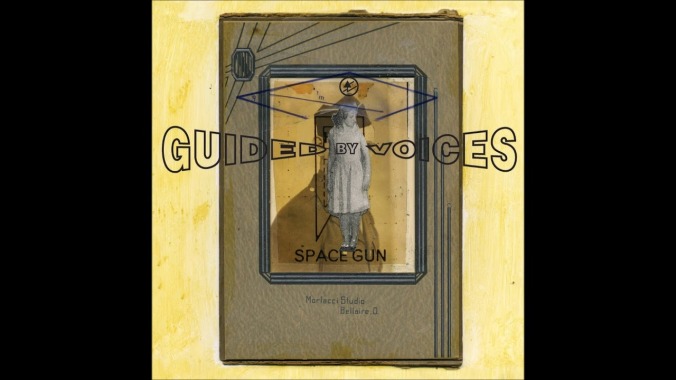GBV, The Sword, and more albums to know about this week


Preoccupations have always been clear about their intentions. Song titles are pithy, one-word descriptors of the subject matter they tackle, and the title of their third full-length, New Material, is about as plain as one can get. But where the band long took up the post-punk sound that’s once again trendy, on New Material, they wade into the waters of new wave. Songs like “Espionage” and “Disarray” have jagged pop sensibilities that draw a line back to bands like Depeche Mode and Orchestral Manoeuvres In The Dark, but Preoccupations are shy about going full-on pop. Songs like “Antidote” start like danceable rave-ups before shifting into harsher, experimental territory. Similarly, New Material is sure to divide fans down the middle, leaving them questioning Preoccupations’ intent as, for perhaps the first time, the band is more keen on playing things close to the chest.
RIYL: Wire’s divisive ’80s records. Orchestral Manoeuvres In The Dark. Depeche Mode.
Start here: “Disarray” is pure sugar, and it shows how good the band is when it isn’t bashful about writing a pop song. [David Anthony]
The third album from Cavern Of Anti-Matter—the midcentury chic krautrock throwback led by Stereolab’s Tim Gane and Joe Dilworth, plus synth-programming whiz Holger Zapf—begins with its best track, the sprawling, 16-and-a-half-minute electronic odyssey “Malfunction.” Opening with some triumphant, educational filmstrip synth-brass notes, it slowly brings in arpeggiated counter-melodies over a simple motorik drum machine, which are then repeated across various other vintage analog synths in tones alternately fizzy and warm, soaring and laser-strobed. You get the idea: This is Science Of Tomorrow stuff as envisioned by the Germans of yesterday, and Hormone Lemonade retains Gane’s career-long fascination with krautrock pioneers like Neu! and Kraftwerk in the mechanical pulse beating beneath these improvisatory jams. As on previous albums, whenever Gane brings in his laidback-funk guitar (“Phase Modulation Shuffle,” “Automatic Morning”), it instantly evokes Stereolab’s space-age bachelor-pad music, and suffers in the absence of Laetitia Sadier’s coos. Still, there’s enough variety here—the sparkling Terry Riley-esque cascades of “Solarised Sound” and “Phantom Melodies”; the analog Aphex Twin-isms of “Outerzone Jazs” and “Feed Me Magnetic Rain”—to make this a worthwhile spin through such thoroughly explored territory.
RIYL: Stereolab. Kraftwerk. Neu! PBS’ Nova. Talking about vintage synths. Tape Op magazine. Turtlenecks.
Start here: “Malfunction” is such a perfect journey through what Cavern Of Anti-Matter is capable of, it almost makes the rest of the album redundant. [Sean O’Neal]
“Stuck in the ’70s” doesn’t quite do justice to the almost pathologically retro crunch of The Sword. Increasingly, these Texas stoner traditionalists seem downright stranded in the classic-rock yesterday, boxed in by the limitations of their blatant throwback sound. Is there a hint of self-awareness in calling their latest collection of time-warp anthems Used Future—an acknowledgement that every step forward is still a step backwards through a thoroughly written rock history? Evolution, on this latest album, amounts to a little sci-fi synth here, a little funk swagger there, and more of a mid-tempo mellow throughout. But most of the songs (including one too many instrumental interludes) are tuneful but not especially catchy. And without the stone-age shredding that was once this band’s life purpose, Used Future is just nostalgic affectation, with the added anti-bonus of pushing frontman John D. Cronise’s Ozzy-lite enunciations and corny lyrics—like those of the vixen-fearing cautionary tale “Deadly Nightshade”—into the unflattering limelight.
RIYL: Your dad’s record collection.
Start here: Nothing on Used Future comes close to kicking like the trad-metal highlights of The Sword’s best record, 2012’s Apocryphon. But “Sea Of Green,” on the other end of the spectrum, has a certain golden-baked appeal, emphasis on the baked. [A.A. Dowd]








![Rob Reiner's son booked for murder amid homicide investigation [Updated]](https://img.pastemagazine.com/wp-content/avuploads/2025/12/15131025/MixCollage-15-Dec-2025-01-10-PM-9121.jpg)

























![HBO teases new Euphoria, Larry David, and much more in 2026 sizzle reel [Updated]](https://img.pastemagazine.com/wp-content/avuploads/2025/12/12100344/MixCollage-12-Dec-2025-09-56-AM-9137.jpg)




